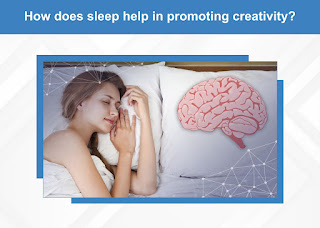Creativity
is a fascinating and essential aspect of human cognition. It's what drives
innovation, fuels artistic expression, and enables problem-solving. While many
factors contribute to creativity, one of the most underestimated and overlooked
is sleep. In this blog, we will explore the intricate relationship between
sleep and creativity, diving into the science behind it and offering practical
tips on how to harness the creative potential of a good night's sleep.
Understanding Creativity
Before
delving into the connection between sleep and creativity, let's briefly explore
what creativity is and why it's so valuable.
Creativity
is the ability to generate novel and valuable ideas, solutions, or expressions.
It encompasses a wide range of activities, from artistic endeavors like
painting and writing to scientific breakthroughs and entrepreneurial
innovations. Creativity is not limited to a select few; it's a cognitive skill
that can be nurtured and enhanced by various factors, including the quality of
your sleep.
The Sleep-Creativity Connection
Many
renowned artists, scientists, and thinkers have credited their creative
breakthroughs to sleep. For example, Salvador Dali famously used a technique
called "slumber with a key" to harness the creative power of the
hypnagogic state, a brief period between wakefulness and sleep, to generate
artistic ideas. But why does sleep have such a profound impact on creativity?
Memory Consolidation: Sleep plays a crucial role
in consolidating and organizing memories. During deep sleep stages,
particularly during Rapid Eye Movement (REM) sleep, the brain processes and
stores information obtained throughout the day. This process not only helps you
remember facts but also allows you to connect seemingly unrelated concepts, which
is essential for creative thinking.
Unconscious Problem-Solving: Have you ever woken up with
a solution to a problem that had been eluding you for days? This phenomenon,
known as "incubation," is a result of the brain continuing to work on
unresolved issues during sleep. When you're asleep, your mind can freely
explore different perspectives and approaches, often leading to innovative
solutions.
Divergent Thinking: Creativity often involves
divergent thinking, which is the ability to explore multiple solutions to a
problem. During REM sleep, the brain is more flexible and can make novel
connections between seemingly unrelated ideas, fostering a more creative
mindset.
Stress Reduction: Poor sleep can increase
stress levels, which can inhibit creativity. Adequate sleep helps reduce stress
and anxiety, creating a more conducive environment for creative thinking.
The Stages of Sleep and Creativity
To
understand how different sleep stages influence creativity, it's essential to
grasp the stages of sleep:
Non-Rapid Eye Movement (NREM) Sleep: This stage includes three
progressively deeper stages of sleep. NREM sleep is vital for memory
consolidation and problem-solving. Ideas and experiences are organized and
stored during these stages, which can contribute to creative thinking.
Rapid Eye Movement (REM) Sleep: REM sleep is when dreams
occur and is closely associated with creativity. During REM sleep, the brain is
highly active, and the mind can wander freely, making unusual connections and
generating creative insights.
Now
that we've explored the connection between sleep and creativity let's discuss
how you can harness the creative potential of sleep:
Tips for Enhancing Creativity Through
Sleep
Prioritize Sleep: Recognize the importance of
sleep in your creative process. Make sleep a priority in your daily routine,
aiming for 7-9 hours of quality sleep each night.
Maintain a Consistent Sleep Schedule: Go to bed and wake up at the
same time every day, even on weekends. Consistency helps regulate your body's
internal clock, enhancing the quality of your sleep.
Create a Relaxing Bedtime Ritual: Develop a calming bedtime
routine to signal to your body that it's time to wind down. Activities like
reading, gentle stretching, or meditation can help prepare your mind for
restorative sleep.
Optimize Your Sleep Environment: Ensure your bedroom is
conducive to sleep by keeping it dark, quiet, and cool. Consider using blackout
curtains, white noise machines, or earplugs if needed.
Limit Screen Time: The blue light emitted by
screens can disrupt your sleep by suppressing melatonin production. Avoid
screens at least an hour before bedtime, and consider using blue light filters
on your devices.
Avoid Caffeine and Heavy Meals Before
Bed:
Stimulants like caffeine and large, heavy meals close to bedtime can interfere
with sleep. Limit their consumption in the hours leading up to sleep.
Practice Mindfulness and Journaling: Engaging in mindfulness
practices or journaling before bed can help declutter your mind and reduce
stress, promoting a more restful and creative sleep.
Capture Your Dreams: Keep a journal or notepad by
your bedside. If you wake up with a creative idea or dream, jot it down
immediately. Dreams can be a rich source of inspiration.
Nap Strategically: Short naps (20-30 minutes)
can boost creativity and alertness. However, avoid long naps that can interfere
with nighttime sleep.
Conclusion
Sleep
is a powerful ally for creativity. By understanding how sleep stages influence
creative thinking and implementing good sleep hygiene practices, you can unlock
your mind's creative potential. Embrace the role of sleep in your creative
process, and you'll find yourself waking up with fresh ideas, innovative
solutions, and a deeper connection to your creative self. In essence, sleep is
not just a restorative act but also a wellspring of creativity waiting to be
tapped.
.jpeg)



Comments
Post a Comment